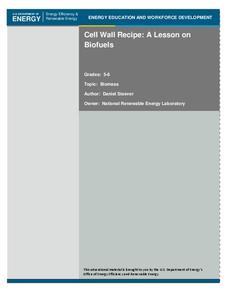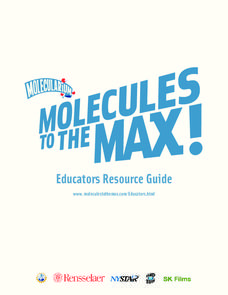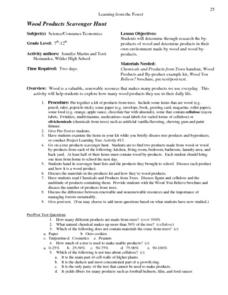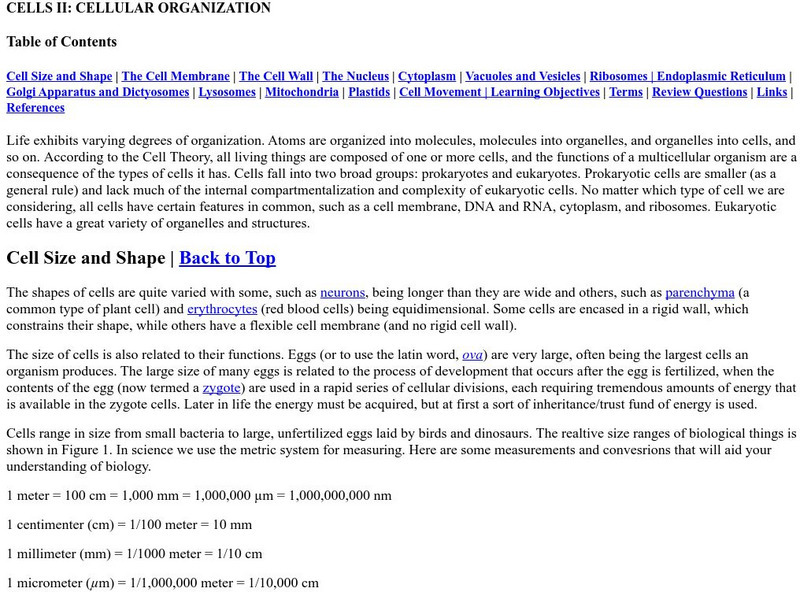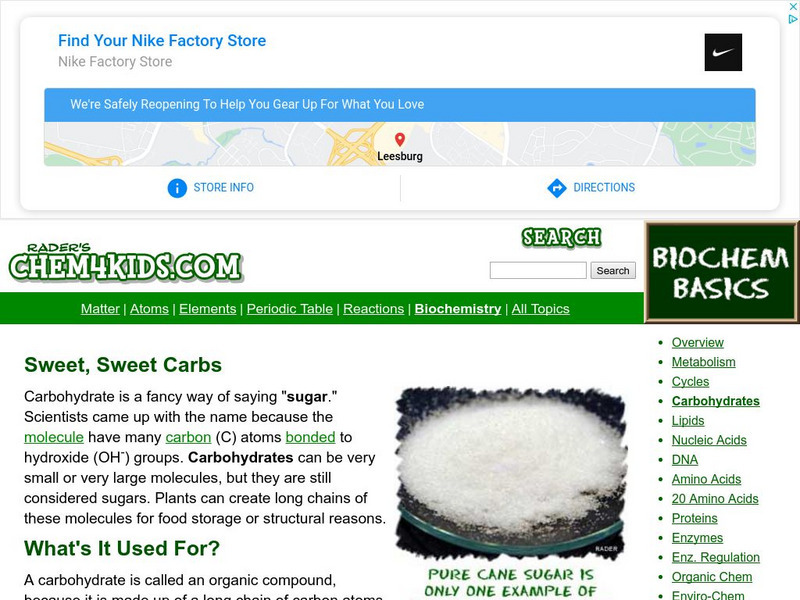Cornell University
Fibers, Dyes, and the Environment
Nanofibers can be made through electrospinning or force spinning in order to reduce the negative impact on the environment. Pupils study the role of fibers and dye on the environment through a series of five hands-on activities. Then,...
Curated OER
Cell Wall Recipe: A Lesson on Biofuels
Biotech engineers discover that changes in the DNA code for cell wall formation can help create crops better suited for biofuel production. They extract DNA from wheat germ. They decode paper strips with codes and relate the activity to...
Nuffield Foundation
Microbes Ate My Homework
Now you have a new excuse not to do your homework. A long-term experiment has learners explore cellulose-digesting enzymes. They simulate how paper breaks down in a compost bin. There's no need to blame your dog for eating your homework...
Rensselaer Polytechnic Institute
Molecules to the Max!—Educators Resource Guide
From molecules to nanotubes, an engaging unit explores the world of tiny science. Fifteen hands-on experiments and lessons engage young scientists as they learn chemistry. Discussions, worksheets, and data analysis reinforce the concepts...
Curated OER
Kingdom Plantae
There are some great diagrams and labels on these slides that support the topic of plants. The definition of kingdoms, and summaries of the vascular systems and gamete production are given. This would be a perfect choice to kick off a...
Curated OER
Photosynthesis
For this photosynthesis worksheet, students complete 20 various types of questions related to photosynthesis. First, they match each description in the first column with the correct vocabulary term in the second. Then, students explain...
Curated OER
The Exceptional Nature of Cellulose
Students observe the affects of a substance's composition and structure have on its solubility. In this cellulose activity students compare the amount of energy required to dissolve mono-saccharides with that required to dissolve...
Curated OER
Determination of the Physical Properties of Dietary Fibers
In this dietary fibers worksheet, students compare and contrast the properties of different fibers: cellulose, hemicellulose, pectin, guar, agar, and xanthan gum. This worksheet has 5 short answer questions.
Curated OER
Biologically Important Molecules
In this biologically important molecules worksheet, students fill in the blank with information about carbohydrates, lipids, and proteins. Students also make notes about nucleic acids.
Curated OER
Cell Structure And Function
In this biology worksheet, pupils respond to 13 multiple choice questions related to cell structure and function. They identify which are microfilamets and which have a cell wall. Students also describe what chloroplasts are and their...
Curated OER
Wood Products Scavenger Hunt
Students investigate the by-products of wood and explore the wood products in their own environment. Products containing both cellulose and silvichemicals obtained from the trees are examined in this lesson.
Curated OER
Science Vocabulary
In this biology worksheet, students identify and locate various vocabulary terms relating to types of cells. There are 13 biology terms located in the word search.
Curated OER
Termite Biology
Students explore the physical characteristics, distribution and habitat of termites. The lesson focuses on the termite as a social creature contrary to most other insects.
TED Talks
Ted: Ted Ed: Biofuels and Bioprospecting for Beginners
Biofuels can provide energy without the reliance on environmentally harmful fossils fuels, but scientists are still searching for a plentiful source. Craig A. Kohn demonstrates how cellulose, the naturally abundant tough walls of plant...
University of Oxford (UK)
University of Oxford: Lipids and Carbohydrates
In this chapter the role lipids and carbohydrates play in living organisms is examined.
Estrella Mountain Community College
Estrella Mountain Community College: Cell Organization
Description of organelles. Links will take you to a glossary with pictures for many of the definitions. Ends with a quiz linked to answers.
Scientific American
Scientific American: What Is an Exothermic Reaction
Scientific American magazine, in the person of Dr. Gerald R. Van Hecke, gives a wonderfully complete answer to this question. Complete with very many hot words for additional background. And a wonderful NASA launch photo.
Khan Academy
Khan Academy: The Extracellular Matrix and Cell Wall
Article examines the external structures of the extracellular matrix and the cell wall and looks at the role they play in different cell types.
Chem4kids
Chem4 Kids: Sweet Sweet Carbs
Here you can learn all about carbohydrates! Content explores what carbohydrates are used for in the body, as well as the different types: saccharides, regular sugars, and polysaccharides.
Colorado State University
Colorado State University: The Large Intestine
Gives a description of some of the functions performed by the large intestine. Includes links to more information.
Ohio State University
Ohio State University: Lipids and Carbohydrates
An introduction to these chemical families. Diagrams are easy to understand and the text explains basic concepts well.
Other
Cha, Inc.: History of the Dupont's and Their Discovery
This site from CHA, Inc. gives a biographical background of the Dupont's and gives information on one of its greatest discoveries, nylon.
University of Hamburg
University of Hamburg: The Cell Wall
This site provides a description of primary and secondary cell wall. Includes an image of cell wall structure.
Sophia Learning
Sophia: Polysaccharides: Lesson 2
This lesson will introduce polysaccharides, including an overview of their structure, and providing multiple examples. It is 2 of 3 in the series titled "Polysaccharides."



